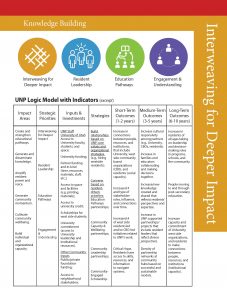
In 2018, UNP took stock of its work over the previous 15 years by celebrating partner and partnership accomplishments. UNP also looked ahead to the future by engaging west side residents and university stakeholders in the creation of a new long-range strategic plan. In the midst of it all, UNP also recognized the need to update evaluation systems in order to engage in continuous inquiry and improvement to fulfill its mission of adapting and evolving to meet community and university priorities, demonstrating impact, and responding to needs.
As a result, UNP reached out to the Utah Education Policy Center (UEPC) at the University of Utah to partner in developing a comprehensive evaluation system that could support the implementation of the UNP Long-Range Plan and provide ongoing information for UNP to engage in continuous inquiry and improvement in telling the story of its impact over time.
Consistent with UNP’s mission, this partnership combines strengths and expertise to enhance the complex work of university-community engagement, as well as providing evidence and insight into one of the University of Utah’s strategic goals of engaging communities to enhance health and quality of life.
As an independent, non-partisan research center, the UEPC is part of the U of U’s College of Education. It bridges research, policy, and practice for Utah public schools and higher education. This partnership is an opportunity to expand its mission to bridge research, policy, and practice and to increase educational equity, excellence, access, and opportunities. The effort to collect, manage, and organize data on UNP activities, partnerships, outcomes, and impact can be used for ongoing partnership development, leveraging resources, and partnership improvement and planning. The UEPC brings to the table expertise in evaluation and data management, with background in evaluating programs and strategies similar to UNP’s.
The process for revitalizing the evaluation system began with a review of UNP’s existing Theory of Change model, as well as goals, indicators, and databases to determine the strengths of the previous system and identified needs for data collection and reporting in the future. We collaborated on developing a new logic model that identifies the inputs, strategies, short- and medium-term outcomes, and long-term impacts for each of UNP’s impact areas.
 Developing the logic model was an intensive process, taking place over several months that required in-depth collaboration with the UNP staff. The outcome is a framework and roadmap for developing a comprehensive evaluation system that will increase UNP’s capacity for ongoing learning and improvement to help implement its long-range strategic plan.
Developing the logic model was an intensive process, taking place over several months that required in-depth collaboration with the UNP staff. The outcome is a framework and roadmap for developing a comprehensive evaluation system that will increase UNP’s capacity for ongoing learning and improvement to help implement its long-range strategic plan.
Once the logic model was completed, the UEPC facilitated the second stage of evaluation system development by incorporating the strengths of the previous data collection system and considering long-term needs, then creating a new system that will be used to collect, analyze, and report on the indicators and outcomes outlined in Logic Model. The UEPC has designed a solution that leverages the resources of UNP, while utilizing a slightly more complex information technology solution.
Now that we are in the final stretch, UNP and the UEPC are collaborating to compile an annual evaluation report based on the new logic model and strategic long-range plan. Similar to previous years, an annual report will present the evidence gathered throughout the year regarding how UNP convenes partners and supports community-engaged initiatives, as well as highlight the outcomes and important work of engaging communities to enhance health and quality of life.
We are excited about the opportunities the new evaluation system will offer UNP and invite you to join us on this learning journey!
Written by:
Cori Groth, Associate Director, Utah Education Policy Center
Abdulkhaliq Barbaar, Partnership Director, University Neighborhood Partners
Jennifer Mayer-Glenn, Director, University Neighborhood Partners
Matthew Pecsok, Lead Data Analyst & Project Director, Utah Education Policy Center
